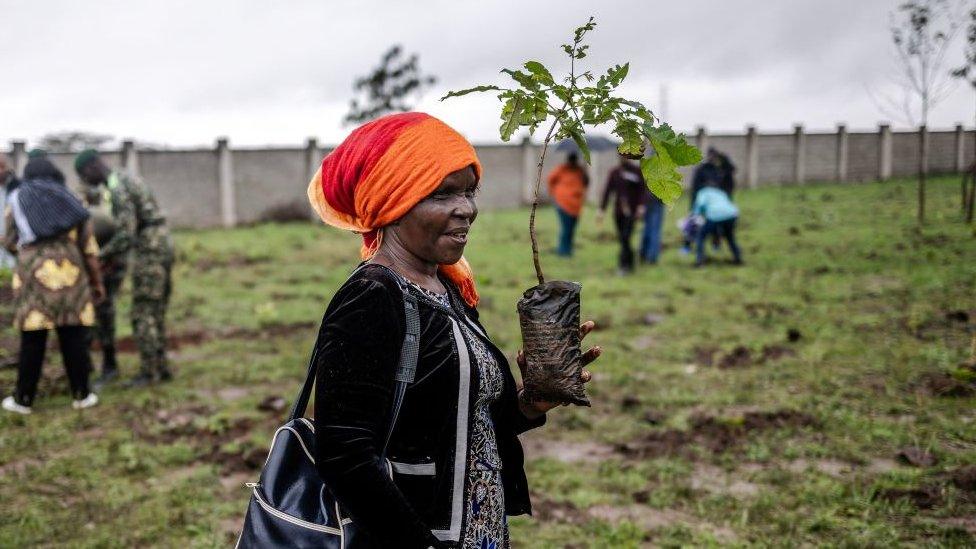Kenya's President Ruto one of four Africans on Time climate leaders list
- Published

Kenyans took part in the country's first tree-planting holiday on Monday
Kenya's President William Ruto has been named by Time Magazine as one of the world's 100 most influential leaders shaping global climate action.
The listing comes in the week he led a national holiday aimed at planting 100 million trees in a single day.
Mr Ruto was named alongside the mayor of Sierra Leone's capital Freetown, Yvonne Aki-Sawyerr.
Burkinabé-German architect Francis Kéré and Ethiopian climate entrepreneur Kidus Asfaw also made the Time list.
The ranking, known as "Time 100 Climate", was released on Thursday, and is the magazine's inaugural attempt to name those it sees as significant in highlighting and doing something about the issue of climate change across the globe.
Time said it selected those listed for "making significant progress in fighting climate change by creating business value".
The magazine also said that the honourees were chosen because their efforts in fighting climate change were recent and produced "measurable, scalable achievements" rather than "commitments and announcements".
Mr Ruto has been vocal in trying to deal with the impact of climate change in Kenya and Africa.
The tree-planting holiday held on 13 November was part of his larger ambition for Kenya to plant 15 billion trees in 10 years.
In September, he hosted the first ever Africa Climate Summit in Kenya's capital, Nairobi, which ended in a joint declaration demanding that major polluters commit more resources to help poorer nations.
But some environmentalists have called Mr Ruto a hypocrite for championing tree planting while failing to tame illegal logging in public forests.
Last month, an environmental court stopped a directive that Mr Ruto gave in June to lift a 2018 ban on logging.
In October, he called for the eviction of people living in the 380,000-hectare Mau Forest.
While some environmentalists hailed the move as critical to safeguarding the forest, some human rights lawyers said the government illegally evicted the Ogiek indigenous community which has inhabited the land for generations to profit from carbon offsetting schemes.
Mr Ruto's recognition as a leader on climate action also came as the World Bank on Friday warned that Kenya's economic output could decline by 7.25% by 2050 if the country fails to tackle climate change.
Architect Francis Kéré was named by Time for his innovative sustainable design projects, including for the state houses in Benin and his home country Burkina Faso.
In 2022, he became the first black person and African to win the prestigious Pritzker Architecture Prize.
Mr Asfaw runs a start-up that repurposes plastic waste into affordable low-carbon construction materials.
Time said that his start-up offers "a sustainable and speedy solution to housing shortages as Africa's population grows".
Mayor Aki-Sawyerr was listed for "tackling environmental degradation and climate resilience" through efforts like developing a climate action plan for Freetown and appointing a chief heat officer for the city, the first in Sierra Leone and Africa.